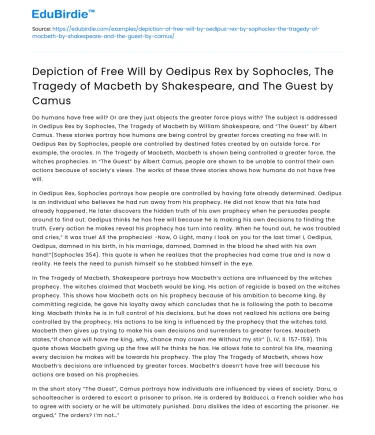Do humans have free will? Or are they just objects the greater force plays with? The subject is addressed in Oedipus Rex by Sophocles, The Tragedy of Macbeth by William Shakespeare, and “The Guest” by Albert Camus. These stories portray how humans are being control by greater forces creating no free will. In Oedipus Rex by Sophocles, people are controlled by destined fates created by an outside force. For example, the oracles. In The Tragedy of Macbeth, Macbeth is shown being controlled a greater force, the witches prophecies. In “The Guest” by Albert Camus, people are shown to be unable to control their own actions because of society’s views. The works of these three stories shows how humans do not have free will.
In Oedipus Rex, Sophocles portrays how people are controlled by having fate already determined. Oedipus is an individual who believes he had run away from his prophecy. He did not know that his fate had already happened. He later discovers the hidden truth of his own prophecy when he persuades people around to find out. Oedipus thinks he has free will because he is making his own decisions to finding the truth. Every action he makes reveal his prophecy has turn into reality. When he found out, he was troubled and cries,” It was true! All the prophecies! -Now, O Light, many I look on you for the last time! I, Oedipus, Oedipus, damned in his birth, in his marriage, damned, Damned in the blood he shed with his own hand!”(Sophocles 354). This quote is when he realizes that the prophecies had came true and is now a reality. He feels the need to punish himself so he stabbed himself in the eye.
Save your time!
We can take care of your essay
- Proper editing and formatting
- Free revision, title page, and bibliography
- Flexible prices and money-back guarantee
In The Tragedy of Macbeth, Shakespeare portrays how Macbeth’s actions are influenced by the witches prophecy. The witches claimed that Macbeth would be king. His action of regicide is based on the witches prophecy. This shows how Macbeth acts on his prophecy because of his ambition to become king. By committing regicide, he gave his loyalty away which concludes that he is following the path to become king. Macbeth thinks he is in full control of his decisions, but he does not realized his actions are being controlled by the prophecy. His actions to be king is influenced by the prophecy that the witches told. Macbeth then gives up trying to make his own decisions and surrenders to greater forces. Macbeth states,“If chance will have me king, why, chance may crown me Without my stir” (I, IV, ll. 157-159). This quote shows Macbeth giving up the free will he thinks he has. He allows fate to control his life, meaning every decision he makes will be towards his prophecy. The play The Tragedy of Macbeth, shows how Macbeth’s decisions are influenced by greater forces. Macbeth’s doesn’t have free will because his actions are based on his prophecies.
In the short story “The Guest”, Camus portrays how individuals are influenced by views of society. Daru, a schoolteacher is ordered to escort a prisoner to prison. He is ordered by Balducci, a French soldier who has to agree with society or he will be ultimately punished. Daru dislikes the idea of escorting the prisoner. He argued,” The orders? I’m not…” Daru hesitated, not wanting to hurt the old Corsican. “ I mean, that’s not my job.” (Camus 1249). This quote shows how Daru tries to express that he doesn’t want to do it and is willing to go against orders. Balducci respond with,” O.K. But the orders exist and they concern you, too. Things are brewing, it appears. There is talk of a forthcoming revolt.”(Camus 1249). Balducci explains to Daru that if he don’t carry this order to make society happy, there will be war. This shows hold Balducci is influenced by society and he does not have free will. When Daru agrees and when it was time for the prisoner to be sent to prison, Daru gave him two choices. The prisoner can either live freely or go to prison. When the prisoner chose the path to prison, it shows how much society pressures his choices. The fact that he tries to go against society for giving the Prisoner choice to freedom caused him to be punish because the prisoner chose the path to prison because of how society view him. This causes for Daru to be ultimately punished by second class citizens for “allowing” the prisoner to go to prison. This shows Daru paying the price for going against a force he cannot control, society.
The three works of Oedipus Rex by Sophocles, The Tragedy of Macbeth by William Shakespeare, and “The Guest” by Albert Camus portray how humans are objects being controlled by greater forces. In Oedipus Rex, Oedipus did not realize his actions are making his prophecies come true. In the play The Tragedy of Macbeth, Macbeth believes every decision he makes are for his ambition. He does not know that he was an individual who has fate determined for him. In “The Guest,” the individual has an order influenced by higher class society but goes against the conformity of first class citizens by disobeying orders but end up being ultimately punished for trying to go against the influence of society. These three works shows how free will is not available to humans. But, will there be free will if humans lives in a modern society where people are not judged or being obsessed with fulfilling one’s desire?






 Stuck on your essay?
Stuck on your essay?

